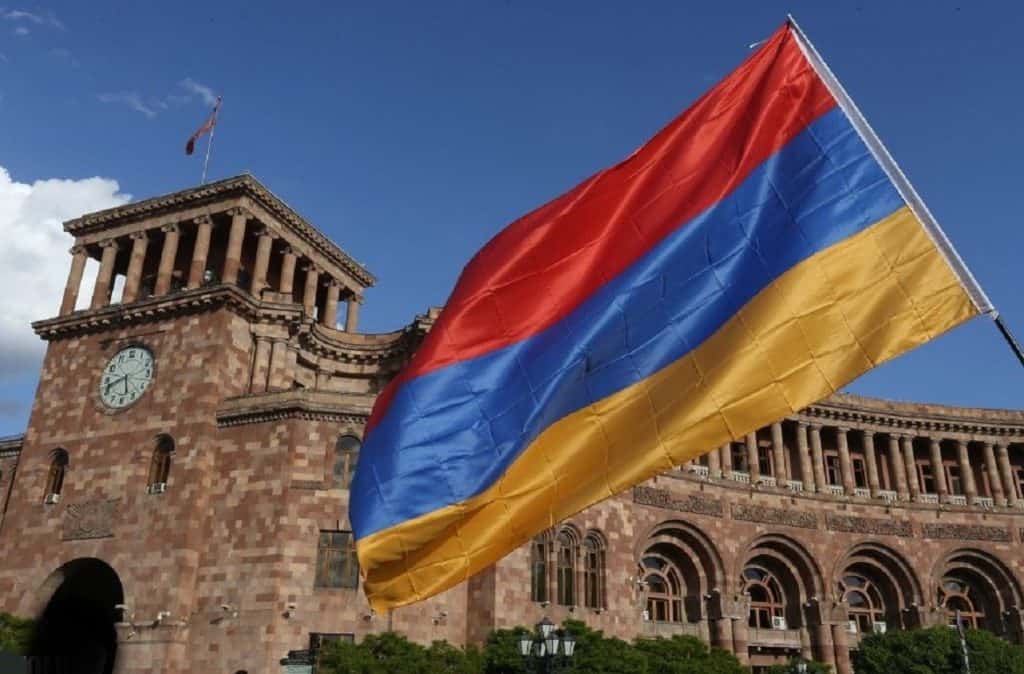World Geostrategic Insights interview with Dr. Gayane Novikova on U.S. engagement in the South Caucasus, prospects for normalization of Armenia-Azerbaijan and Armenia-Turkey relations, Russia’s mediating role, and foreseeable new scenarios in Armenian foreign policy.

Dr. Gayane Novikova is the Founder of the Spectrum Center for Strategic Analysis, Yerevan, Armenia, and an Associate, Davis Center for Russian and Eurasian Studies, Harvard University. For several years she was the Co-Chair of the Regional Stability in the South Caucasus Study Group of the NATO Partnership for Peace (PfP) Consortium of Defense Academies and Security Studies Institutes.
Q1: In recent months, the United States and Armenia have reaffirmed their commitment to strengthening bilateral relations in all areas. U.S. Secretary Anthony Blinken also stated to the Congress: “We are opposed to any unilateral action, especially by Azerbaijan, which is exacerbating the situation.” Moreover, Robert Menendez, a Chairman of the U.S. Senate Foreign Relations Committee, said during a hearing on foreign policy in the Caucasus: “How can the United States justify any support for the ruling regime in Baku, whether in the security field or otherwise? It is inexcusable.”
According to some analysts, these are just political statements aimed at a domestic audience, namely Armenians living in the U.S. What is your opinion? Does the United States have a real role to play in the region?
A1: The U.S. engagement with the South Caucasus states has a long history. In the case of Armenia there is an additional significant element: The Armenian Diaspora. However, current U.S. increased activity and involvement – as concerns Armenia – cannot be defined only by the efforts of the Armenian lobby and/or the Armenian Diaspora per se.
The U.S. has been gradually intensifying its involvement in the region’s affairs driven by two main issues – the uninterrupted energy supplies from Azerbaijan to the EU states and the danger of another full-fledged war between Armenia and Azerbaijan.
It should be mentioned that, after its military defeat in the 2020 Nagorno-Karabakh war, Armenia has found itself under unprecedented political and diplomatic pressure from Azerbaijan, Turkey, and Russia. All three states have been trying to gain concessions – as many as possible – from Armenia. Furthermore, since the beginning of the Russian-Ukrainian war, pressure has increased even more, bringing the country to the verge of losing its sovereignty and territorial integrity.
For the U.S., as a world power and a Co-Chair of the OSCE Minsk Group, it is important to provide political and diplomatic support to the democratically-elected government of Armenia, to stand for Armenia’s sovereignty and territorial integrity, and to contribute to the achievement of a long-lasting peace between Armenia and Azerbaijan. The statements you have quoted confirm these intentions.
I would also note successful diplomatic intervention during the intensive fights between the Armenian and Azerbaijani armed forces in the territory of the Republic of Armenia on September 13-14, 2022, followed by the official visit to Yerevan of Nancy Pelosi, Speaker of the U.S. House of Representatives. Mrs. Pelosi strongly condemned Azerbaijan’s attacks on Armenia’s sovereign territory. She stressed that the U.S. wants to support Armenia in what she defined as “a global struggle between democracy and autocracy.”
In the course of the most recent escalation of the tensions between Azerbaijan and the Armenian population of the unrecognized Nagorno-Karabakh Republic (Artsakh) the U.S. expressed its concerns regarding the situation caused by the blockade of the only roadway between Armenia and Artsakh – the Lachin Corridor. The Corridor has been blocked by government-sponsored Azerbaijani activists who call themselves “ecologists” since December 12, 2022, causing an acute humanitarian crisis in Artsakh. The U.S. has been viewing this action of Azerbaijan as a significant setback in the peace negotiations process and pointing out the growing humanitarian implications. In particular, on January 6, 2023, the U.S. Ambassador to the OSCE, Michael Carpenter, called both Azerbaijan and Russia immediately to restore access to Artsakh.
In the meantime, it is necessary to acknowledge that Washington has no strong leverage to force Baku to peace. This means that U.S. involvement in the resolution of the Nagorno-Karabakh conflict has limitations that are conditioned by the following issues:
– Since November 2020, Azerbaijan has been considering the conflict as resolved; it totally ignores the OSCE Minsk Group.
– The U.S. military assistance provided to Azerbaijan has disproportionately increased in comparison with assistance to Armenia. In 2019, it was USD 100 million for Azerbaijan vs. USD 4.2 million for Armenia; in 2022 – USD 164 million vs. USD 600 thousand, correspondingly).
– Since the outburst of the Russian-Ukrainian war Azerbaijani energy resources have become crucial to the EU and, indirectly, to the U.S.
– In addition, although united Israeli and Turkish lobbies cannot prevent the pro-Armenian statements, they are capable of preventing any pro-Armenian actions.
As for now, the U.S. will remain as an active observer of the developments in the area of the Armenian-Azerbaijani conflict. It will employ only diplomatic means to place pressure upon Azerbaijan.
Q2: On October 31, a meeting was held in Sochi between Pashinyan, Putin, and Aliyev, where a joint statement was adopted. The process of preparing a peace treaty between Armenia and Azerbaijan seems to be moving forward. Is it really possible to reach in the coming months a normalization of relations between Armenia and Azerbaijan?
How do you view the mediating role of Russia?
Is it possible to reach a normalization of the Armenia-Turkey relationship?
A2: After the 2020 war Armenia’s position at the negotiation table is significantly weakened, thereby leaving it with a very narrow space for maneuvering. In the meantime, the outcome of the war provided Azerbaijan with an opportunity to increase its pressure – including military intrusions into Armenia’s proper and the blockade of Artsakh – demanding and forcing Armenia to make further serious territorial concessions. Although there are three tracks for the negotiations – under the aegis of Russia, the European Council, and the U.S. – we are witnessing the stagnation of all.
I already mentioned the looming humanitarian crisis in Artsakh. It has worsened even more since the beginning of January 2023: The only high voltage cable which provides electricity from Armenia to Artsakh, passing through the territory controlled by Azerbaijan, was cut. Therefore, we are dealing with a model example of ethnic cleansing, namely of the Armenian population of Nagorno-Karabakh.
I don’t see any positive shifts or even small steps which could, in the midterm perspective, reduce tension and de-escalate the situation, to say nothing about a normalization of relations between Armenia and Azerbaijan. Azerbaijan is trying to provoke Armenia to take action(s) which can become a pretext for a new war.
Regarding Russia’s role as a mediator. Two armed conflicts – the 2020 Nagorno-Karabakh war and the ongoing Russian-Ukrainian war – have affected Russia’s standing in the South Caucasus, signaling that it has diminishing political, military, and diplomatic tools to influence developments in this region. The following three factors should be considered. The South Caucasus has been transformed gradually into an arena of increased Russian-Turkish multi-dimensional competition. One of the indicators is the Joint Russian-Turkish Center for Monitoring the Ceasefire opened on February 1, 2021: After approximately 100 years Turkey secured a military presence in the region.
During Azerbaijan’s direct military attacks on Armenian territory Russia was unable to fulfill its obligations regarding security provision to Armenia – neither in accordance with the 1995 Russian-Armenian military treaty nor with the Article 4 of the CSTO Charter.
The Ukrainian war made Russia economically strongly dependent on Turkey and Azerbaijan owing to the fact that a certain volume of its energy supplied to the EU states flows through Azerbaijani and Turkish pipelines. Turkey has also been acting as a mediator in the Russian-Ukrainian confrontation. Since Turkey and Azerbaijan have become indispensable partners for Russia, the latter’s mediator role in the Nagorno-Karabakh conflict resolution has become more complicated.
I am quite pessimistic about the possible results of the negotiations aimed to improve the Armenia – Turkey relationship. The parties agreed to operate direct air cargo flights, as well as to enable the crossing of the land border between Armenia and Turkey by third-country citizens visiting Armenia and Turkey respectively. However, the main issues, such as the establishment of diplomatic relations and the opening of the Turkish-Armenian border fully depend upon progress in the Armenia-Azerbaijan negotiations, or in other words, upon a “good will” of the Turkish-Azerbaijani alliance.
Q3: Azerbaijan, which is basically an authoritarian regime, has often been seen by the Western democracies as an ally against Iran and Russia, thus pressuring Armenia, a democratic regime, to depend on Russia, and also strengthen its relations with Iran. However, Armenian PM Pashinyan reaffirmed that Yerevan aims to strike a balance between Russia and the West in order to be a direct, honest and reliable partner for both Russia and the West. What is your opinion? Is it possible to foresee new scenarios in Armenia’s foreign policy?
A3: The geopolitics and the security landscape of the broader South Caucasus is too complex to analyze the developments in this area in terms of “the enemy of my enemy is my friend.” I don’t think that Azerbaijan can be viewed as an ally against Russia and Iran. Although Azerbaijan has some disagreements with these states, and even conflicting interests, it acts very cautiously when it comes to confrontations with both regional powers. Even though Azerbaijan is an authoritarian state, it is an important partner for the collective West, which currently is facing a serious energy crisis. Under the given circumstances, the EU – and the U.S. – are willing to put aside their criticism of the Aliyev regime for the sake of avoiding a collapse of some European economies and possible social unrest.
Armenia, Iran, and Russia became even more mutually dependent, especially after February 24, 2022, of course, to a different degree. Russia and Iran are under the U.S. and the E.U. sanctions, and both countries are operating through Armenia. In its turn, Armenia’s dependence on Russia is long-term and structural, which makes Armenia very vulnerable, especially regarding its security concerns. Iran is viewed in Armenia as a friendly country and an additional – to Russia – provider of energy supplies.
Against this background, Armenia does not have many choices. Its frustration with Russia is understandable; its hope for significant political, economic, and diplomatic assistance from the West is probably baseless and naïve.
However, the presence of Azerbaijani military units in the territory of the Republic of Armenia, combined with the blockading of Artsakh by Azerbaijan, can push Armenia to implement a more balanced, or to some degree even pro-Western, foreign policy. The outcome of this possible shift is unpredictable: The geopolitical games around Armenia endanger its sovereignty.
Dr. Gayane Novikova is the Founder of the Spectrum Center for Strategic Analysis, Yerevan, Armenia, and an Associate, Davis Center for Russian and Eurasian Studies, Harvard University. For several years she was the Co-Chair of the Regional Stability in the South Caucasus Study Group of the NATO Partnership for Peace (PfP) Consortium of Defense Academies and Security Studies Institutes.
Dr. Novikova’s areas of expertise cover international relations and regional security issues, including but not limited to armed conflicts and unconventional threats, Russia’s, the U.S., and Turkey’s politics in the South Caucasus, as well as the EU Eastern Neighborhood Policy.







